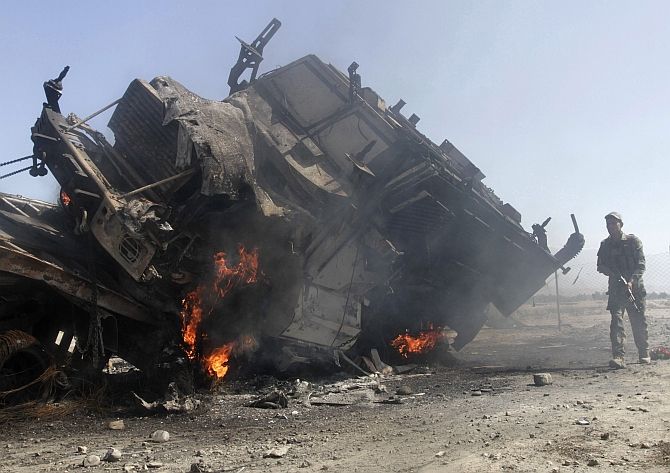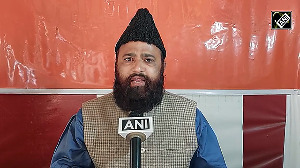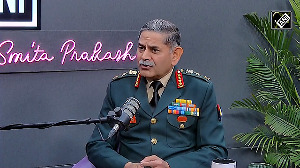
Iraq is on the verge of collapsing and foreign military intervention is inevitable. But for those who follow the developments in Iraq and the Middle-East will understand the current situation is nothing but a culmination of US and western policies toward the region, says Dr Waiel Awwad.
The sudden flare up of terrorist activity in Iraq captured the world’s attention and reflected the grave danger of what is going on in Iraq. The paraded killings of Iraqi soldiers and the fleeing civilians from Mosul city of Iraq were enough of a reminder to the international community to build up a public opinion on the gravity of situation.
Iraq is on the verge of collapsing and foreign military intervention is inevitable. But for those who follow the developments in Iraq and the Middle-East will understand the current situation is nothing but a culmination of US and western policies toward the region.
The chronology of events can be traced since the US invasion of Iraq in 2003 under the pretext of finding weapons of mass destruction but later admitted by the US decision makers that it was nothing but the lust for the control of Iraqi oil.
SITA axis
The US never shies away from stating its main objective in the Middle-East, which is oil and Israel security. The situation in Iraq and Syria serves both these objectives.
The legacy of the US occupation was supporting one group against the other to ensure that the 100 commandments of governor Paul Bremer in which Iraq was on the road of ensuring a sectarian democracy. For the Gulf Cooperation Council countries, it was seen as supporting the Shia majority against Sunni minorities. But the fact of the matter was the division of Iraq was planned and hatched by the American and Saudi officials.
The assurances given to the American administration to join hands with the Al-Qaeda after Afghanistan is communicated through the former ambassador of Saudi to US, Bandar Bin Sultan: “We have created this and we can control it.”
Therefore, the American policy was always was to pitch one group against the other and supporting the Shia majority was part of the long strategy drawn by the neo-cons.
When the US troops left Iraq in 2011, Prime Minister Nouri al-Maliki refused to allow permanent military bases for US without any legal ligation against its soldiers. The American left behind a legacy of more than a 100,000 imprisoned Iraqis, half a million dead with more than thousand deaths per month, million widowers and half of the population internally displaced. The ironic part is that they still argue that they achieved their objectives of promoting democracy in the Middle-East.
Then came the Arab spring and the toppling of Muammar Gaddafi in Libya by Al-Qaeda. US sponsored terrorist groups and the US admitted it, which was mentioned in Seymour Hersh’s book.
Sunni extremists and Al-Qaeda sympathisers, were nourished, armed and trained in Jordanian camps and Turkey by the CIA and they were sent to Syria to topple the Bashar al-Assad government. The ISIS strengthened its hold on the region in the northern part of Syria and recruited people from the region. Experts clearly and repeatedly reported that the war in Syria was not a revolution but a true invasion of foreign troops and the main aim was to recolonise Syria and Iraq.
US experts admitted that there a quarter of a million foreign fighters in Syria of more than 80 nationalities. And only 100,000 were left fighting and causing havoc in Syria to keep the war simmering. The region bordering Iraq and Syria (the Sunni majority in Iraq) was used as a training spot and shelter to terrorist groups. At the same time, the Europeans allowed their citizens to join the ‘Holy war’ in Syria to make the situation so grave and dangerous that this ‘terrorist hub centre’ is a threat to its national security and they must intervene militarily.
When Syria held elections and achieved strategically on the ground against this group from taking control of Syria, the focus was shifted to Iraq, which was also undergoing election and Maliki would emerge the winner. They allowed the flow of arms and ammunitions from Libyan stores, Jordan and Turkey into Syria and Iraqi and all were funded by Saudi Arabia and Qatar.
Al-Maliki is considered a dangerous leader and GCC wanted him out of power because of his alliance to Syria and Iran and started projecting him as a radical Shia against minority Sunnis. This SITA (Saudi Arabia, Israel, Turkey and America), who kept the pot boiling in the region, are opposing any military action by the US in support of the Iraqi government. Turkey opened its border with Syria since the beginning of 2010 and the area was buzzing with radical groups from Libya, Tunisia, Saudi Arabia, Chechen, Afghanistan, Taliban and other westerners. Arms allowed freely into Syria, factories were dismantled and smuggled to Turkey along the porous border and Iraqi oil was smuggled and stored in Turkey.
The current government of Turkey undoubtedly has some leaders who still believe in reviving Ottoman Empire and will end up conquering Mosul in Iraq and Aleppo in Syria.
Maliki the scapegoat
The grave situation in Iraq has led many to believe that Maliki is solely responsible for the mess created and of course not the US invasion. For US to attack advancing ISIS cadres, Al Maliki must seeks reconciliation measures to prevent them from advancing to Baghdad. Suddenly the US has become the peace broker and there is talk of forming a wider based government to include the entire representatives in Iraqi society.
The western media intentionally avoided broadcasting the amount of atrocities committed by the terrorist groups, while tarnishing the image of both Syria and Iraq to build up the public opinion against them so that their main objective of regime change can be achieved.
The eminent threat from ISIS has led the Shia clerics to call for joining the government of Iraq in its defence against the threat. This also alerted the Iranians who were apprehensive and concerned about the eminent threat to the Shia shrines in Iraq. The US would like to replace Al Maliki to enhance the fall of Syria in the hands of extremists after three years of failed proxy war on Syria and repeated attempts at the UN Security Council to authorise military action against Syria.
The Indian dilemma
The fall of Mosul in the hands of ISIS led to many foreign workers, including the Indian workers, to fall in the hands of this international terrorist group that could be used as a human shield or a bargain chip to achieve other aims through handing them over to Taliban elements in the ISIS.
This is the worry, the presence of Afghan and Pakistani Taliban within the foreign fighters. Or it could be used to build up a public opinion in India in support of New Delhi military intervention with US. A move that reminds us of the intentional destruction of the Buddha statues in Bamyan by the Taliban that forced Japan to take part in the American war. According to well-informed sources, the abducted Indian workers are safe.
The other worries for India is the policy of the US and the west in Africa and the Arab world in which respective country is handed over to militia groups and oil is sold to them at their own price list as a condition to continue supporting them. This is evident in stateless Libya and now Iraq. The biggest challenge to India and China will be after the withdrawal of US and NATO forces from Afghanistan and repeating the scenario or Iraq by unleashing militant groups
The war is far from over and future of stability in the Middle-East is a mirage and peace and security is uncertain because of the onset of sponsored sectarian violence, which erupted in these countries.
This will lead to dissemination into other regional countries including Turkey and Jordan, while Israel, the sole beneficiary, keeping the arms flowing to militant groups in Syria and Iraq and will intensify its pressure on the Palestinian authority to come to its term, conquer more lands, create a buffer zone in its border with Syria under the pretext of saving itself and continue its policy of building settlements in the occupied Palestinian territory.
What started as an Arab spring, turned out to be actually an American spring which now favours human hunting.
Photograph: Reuters
Dr Waiel Awwad is a senior journalist based in South Asia











 © 2025
© 2025